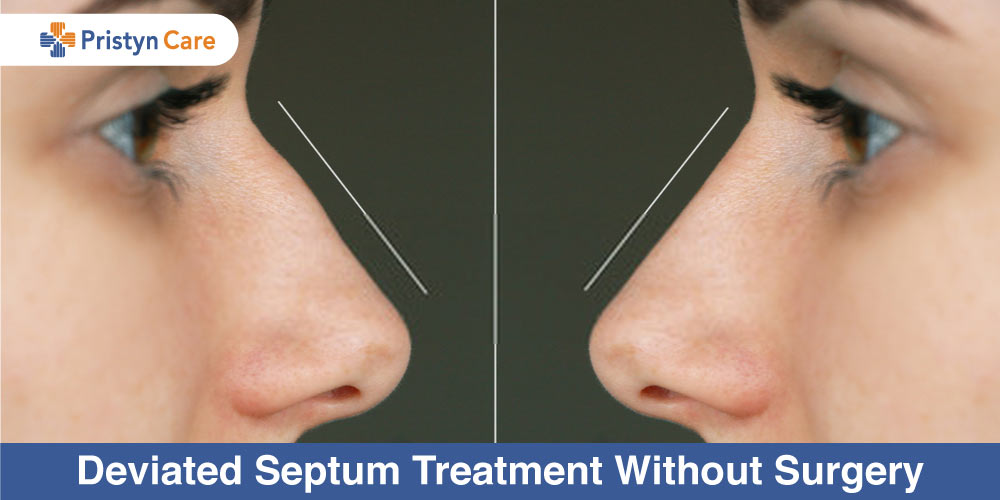
Surgery is indeed the most effective and promising treatment option for curing a deviated septum. But, what if there’s a simpler way that can make the life of someone with a deviated septum a little less uncomfortable.
Before going ahead with the decision of undergoing the deviated septum surgery, there are some other options one can consider first.
Obstruction in the nasal cavity due to a deviated septum can often get worse by allergies or infections. Hence, it makes sense to treat the allergy or infection to improve airflow so that the person can breathe more freely. Here are some options both medicated and natural that can help with the rising congestion inside the nasal cavity due to a crooked septum.
Table of Contents
Nasal steroids
People with deviated septum often have discomfort and difficulty breathing, especially when they have allergies and infections. One of the most effective treatment options to alleviate allergic reactions is nasal steroids.
These are available over-the-counter also. However, it has to be kept in mind that for proper relief, this medicine needs to be used over an extended period of time. Moreover, some of the side effects that can occur are dryness, stinging, soreness in the throat and in rare instances, nose bleeds. If someone is suffering from a prolonged medical condition, they should talk to the doctor or pharmacist before using steroid nasal sprays.
Allergic medicines
Inflammation due to an allergy can make the effects of deviated septum worse. In such cases, antihistamines can be effective. Antihistamines are available in both chewable tablets and nasal sprays. Although these can work, make sure to choose a medicine that doesn’t result in drowsiness which can otherwise interfere with driving or working.
Nasal strips
These are like band-aids that stick on the nose and have spring-like bands. These bands help to lift the sides of the nose away from the septum, thereby opening up the nasal passages for better airflow. People should wear these at night before going to bed. Moreover, wearing these at night also reduces snoring considerably. These are easily available at local pharmacies and can be purchased without any prescription.
Nasal dilators
Dilators of the nose open the nasal passages mechanically and decrease the resistance to the air coming inside. There are mainly two types of nasal dilators- external and internal. External nasal dilators pull from outside whereas internal nasal dilators push it from the inside.
Nasal Valve Support
The nasal valve support is placed inside the nose and removes obstruction in the front part of the nose thereby improving airflow without any discomfort, irritation. As it is placed inside the nose, it is not noticeable to others.
Nasal irrigations or Neti-Pot
Neti- pot is a nasal irrigation system. In a typical nasal irrigation system, the person simply pours a saline solution through the nasal cavity. This is the most natural solution to clear the mucus and relieve out sinus pressure. Moreover, this can also boost up the effectiveness of the cilia inside the lining of the nose and clear out mucus. These saline solutions are also available at local pharmacies bottled. After using a neti pot, make sure to clean it to minimize the chance of any infection. Ideally, instead of tap water use boiled and cooled water.
Vaporizer or Humidifier
A vaporizer or humidifier is a small machine that simply adds moisture to the air. Dryness in the nose can make symptoms of deviated septum worse. Hence, breathing moist air can relieve out stuffy nose, especially if there is an episode of sinusitis. Vaporizers make steam by heating water hence, keep these away from children. In the room in which you keep the vaporizer or humidifier, ensure there is proper ventilation. Or else, the damp hair can be a perfect place for bacteria, mold and dust mites to thrive. After using the vaporizer or humidifier, make sure to clean it properly.
Taking a hot shower
The effects of using a vaporizer and taking a hot shower are the same- breathing in moist air. Hence, taking a hot shower will help in reducing nasal congestion due to nasal obstruction caused by a deviated septum.
Avoiding Irritants
For a person with a deviated septum, allergies are the biggest trigger and make the congestion worse. Therefore, make sure that you avoid any kind of irritant that can trigger one. Stay away from irritants such as pollen, dust mites, animals, etc. Some people are also allergic to smoke, paint fumes, household chemicals, or perfumes. Hence, stay away from these chemicals also. Some food allergens such as red wine, milk can also trigger nasal congestion.
Natural Treatment
Another rare treatment option is Breathing Retraining Therapy. This is a natural therapy that can alleviate symptoms caused by a deviated septum. Developed in 1952, this technique is specifically designed to improve functional breathing patterns. People with a deviated septum generally tend to suffer from over-breathing and need to normalize this hyperventilation. This breathing technique aims to train the body to breathe more slowly and regularly.
Conclusion
All these options can make it possible for an individual with a deviated septum to live without undergoing surgery. But there’s no surety that these cannot make the already existing medical condition worse. In severe cases, children are unable to breathe due to nasal obstruction calls for surgical intervention. ENT doctors recommend, in such cases, undergoing a septoplasty.
For someone looking for any queries related to septoplasty, can consult with an ENT specialist from Pristyn Care who can help with all the answers. Drop your query below or book your consultation today!
Read More:







